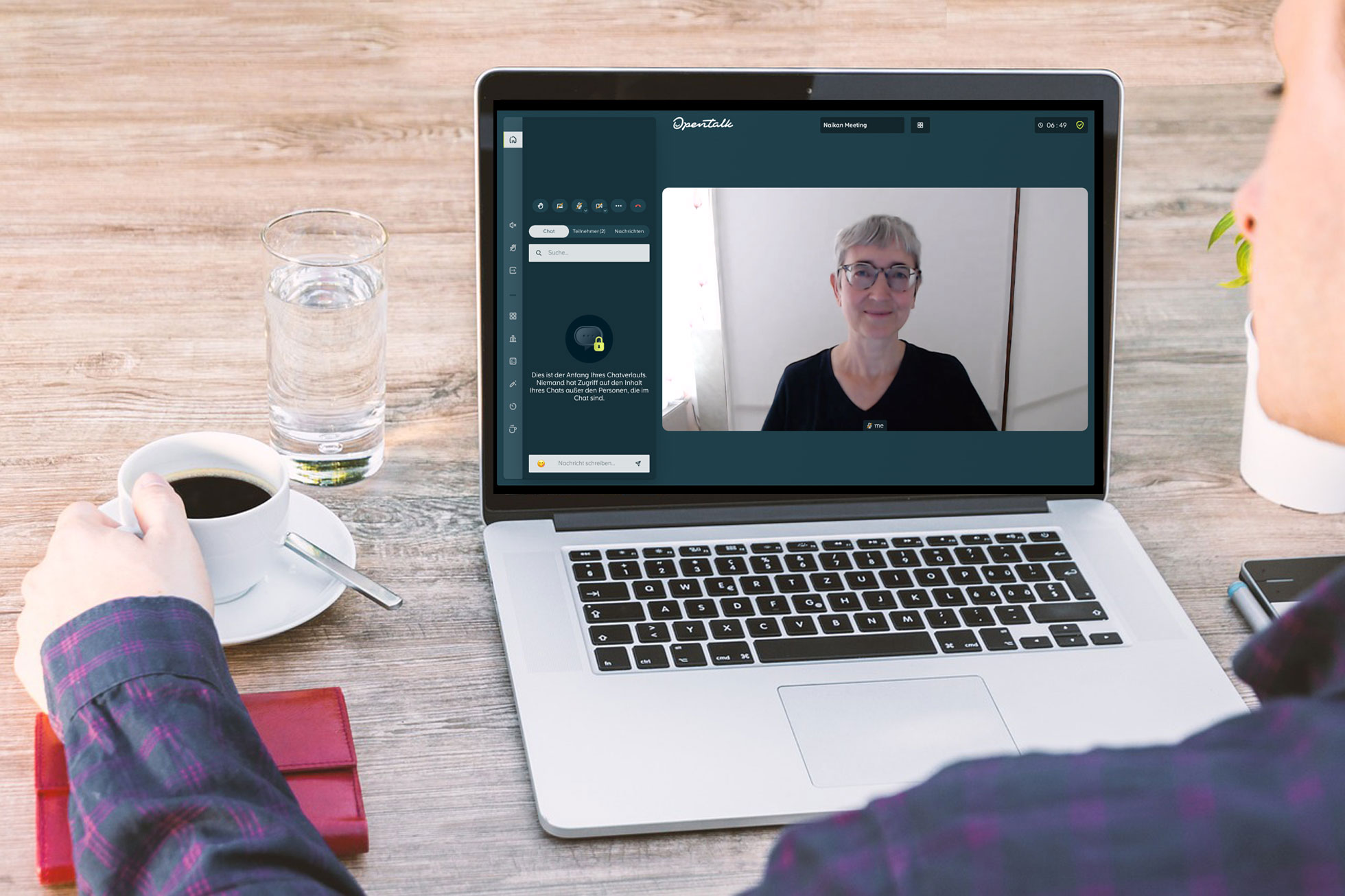- What have I received from a specific person?
- What have I given, what have I done for this person?
- What troubles and difficulties have I caused this person?
5-days Naikan Retreat ONLINE
Private Silence Retreat ONLINE
Naikan as a break from everyday life, in the form of a silent retreat and a place for self-reflection, also works beautifully as an online retreat.
Naikan means looking inside to explore one's inner self. You go into silence to get deeply in touch with yourself. The three simple questions of Naikan will help you to look at yourself with new eyes. Find new perspectives and discover your inner resources.
A Naikan retreat is intense, you work on your experience with relationships and themes from morning till night, every day. Of course, you can take a break anytime. The Naikan instructor provides an external framework and personal guidance. How you use this outer framework is your personal decision.
What is offered
- Individual talks with instructor
(Choose the language: English, Français, Deutsch)- Naikan practices
- Personalized for one person
Individual retreat for 1 person only, no group setting.
For all levels: beginner, intermediate, advanced.Costs
5-days Naikan Retreat ONLINE
Fee: 490 EuroOptional: You would like to practice Naikan for more than 5 days? You are welcome! 1 to 2 additional days of Naikan practice are possible in any case. Please contact me if you are interested. - Cost per additional day: Euro 100,-
Withdraw and be in silence
Ideally, attending a Naikan retreat you withdraw and you are in silence so that you can practice Naikan as undisturbed as possible during the entire duration of the retreat, i.e., concentrate on your introspection and not be distracted by the outside world.
Therefore we recommend the following for the online Naikan retreat:
- a practice area that is as undisturbed as possible (for retreats lasting several days, your sleeping place is ideally at your place of retreat),
- organize meals and beverages etc. before the start of the retreat, purchase everything you need (food, etc.) in advance (you can cook yourself in the retreat or have ready-made meals brought to you),
- no communication with others (it is best to inform family and friends before the retreat that you will not be available for the duration of the retreat − if it’s not possible for you to completely withdraw, we recommend setting a certain time window per day where you can be reached by the outside world),
- no media distractions (use cell phones and/or computers only for our Naikan conversations, no TV, no radio, no reading).



Can you withdraw to a quiet place for the entire duration of the Naikan retreat, where you will not be disturbed by others?
This is the ideal hiatus from everyday life: as if you are traveling and spending a few days in an isolated hut or in a Naikan Center in meditation, in line with the motto: "I'll be gone for a while and I’m not available to anyone – I’m taking care of myself for a few days."
The Naikan exercise ends shortly before bedtime, e.g. approx. 9 p.m., and starts the next day after breakfast, e.g. 9 a.m. Are you a night owl? Then let your Naikan day end later, e.g. around 10 p.m. or 11 p.m. Are you a morning person? Then let's start Naikan earlier in the morning, e.g. 7:30 a.m. or 8 a.m.
The Naikan day consists of 8 to 10 online Naikan conversations. We agree on the times together: in one-on-one Naikan, we can customize the process.
Do you have a place to withdraw to, but can’t withdraw continuously because you have to be available during the Naikan retreat or have to tend to everyday affairs?
This is a therapeutic hiatus: reduce the business of everyday life and take as much time as possible for yourself. Online one-on-one Naikan creates the opportunity to design your retreat individually, by mutual agreement.
Perhaps you’d like to be available to your family in the evenings? Then let your Naikan day end a little earlier, e.g. around 6 p.m. or 7 p.m. Or maybe you want to tend to your everyday affairs in the morning and get them out of the way? Then let's start Naikan later in the day, e.g. at 10 a.m. or 11 a.m. Do you need a longer break in between? Then we just integrate a 2- or 3-hour break into the daily routine. We agree on how your day is structured together.
Sample itinerary
Start: At the beginning, the instructor gives an introduction, explaining the setting and the Naikan method.
Naikan practice: After the introduction, the Naikan practice starts. Naikan is an individual self-reflection, there are no group activities. You are in a quiet place and practice Naikan. There are 6 to 9 conversations with your Naikan guide via videochat or audio, timing is individually agreed. If possible, there are no contacts to people outside the retreat.
End: The instructor gives additional information in a final conversation at the end of the retreat.
Day 1
- 13:00 Conversation and introduction, explaining the setting and the Naikan method
- 14:00 Start of Naikan practice: You work independently with Naikan in silence
- 15:00 1st individual talk, followed by Naikan practice
- 16:30 2nd individual talk, followed by Naikan practice
- 18:00 3rd individual talk, followed by Naikan practice
- 19:30 4th individual talk, followed by Naikan practice
- 21:00 5th individual talk, End of the Naikan day
Day 2, 3, 4
- 09:00 1st individual talk, start of Naikan practice: You work independently with Naikan in silence
- 10:30 2nd individual talk, followed by Naikan practice
- 12:00 3rd individual talk, followed by Naikan practice
- 14:00 4th individual talk, followed by Naikan practice
- 15:30 5th individual talk, followed by Naikan practice
- 17:00 6th individual talk, followed by Naikan practice
- 18:30 7th individual talk, followed by Naikan practice
- 20:00 8th individual talk, followed by Naikan practice
- 21:30 9th individual talk
Day 5
- 09:00 1st individual talk, start of Naikan practice: You work independently with Naikan in silence
- 10:30 2nd individual talk, followed by Naikan practice
- 12:00 3rd individual talk, followed by Naikan practice
- 14:00 4th individual talk, followed by Naikan practice
- 15:30 5th individual talk
- 16:00 Final conversation
- 17:00 End of retreat
Different Time Zone?
The times listed above are Time Zone Vienna, Austria: UTC+1 Central European Time, UTC+2 Central European Summer Time. If you are located in a different time zone, we can change the schedule. Please contact me to arrange an individual schedule.
Since it is an individual retreat, (no group activity), we can discuss the daily schedule and adapt it to your personal needs. If you want to start later in the morning or stop later in the evening, that's no problem.
If you wish to integrate other forms of practice, please let me know. It is not necessary to interrupt your daily practice (e.g. yoga or meditation) during the retreat.
How do the online Naikan conversations work?
We agree beforehand which technology we will use for the online discussions: video calls (e.g. Opentalk or Skype or Signal) or only audio (e.g. Signal or Telegram or telephone). You will receive contact details a few days prior to the start of the retreat.
An exact time must be agreed to start Naikan so that we can discuss all the details of the process. This first conversation at the beginning of the retreat will take about 1 to 2 hours.
The time for the following Naikan conversation (around 6 to 9 conversations per day) is agreed during the current conversation. An online Naikan conversation takes about 10 to 30 minutes.
In addition, I am at your disposal around the clock during the retreat for urgent matters. For this purpose, I use a separate cell phone number, which you will also receive before the Naikan retreat.

What is different in the online Naikan retreat?
Self-sufficiency
An element that has a major impact during the on-site Naikan retreat at the Naikan House is something that can only be offered in a personal encounter at a Naikan Center or a seminar house: all-round care from the very first to the very last day. At an on-site retreat at the Naikan House, I, as the Naikan guide, am responsible for the setting (daily structure, meals, avoiding media, undisturbed withdrawal, etc.); so, you don't have to worry about that at all. Being cared for and knowing that the “Naikan reception” is manned around the clock creates a feeling of security in the sense of comfort.
In the online Naikan retreat, on the other hand, self-sufficiency is the order of the day: you are responsible for the setting (daily structure, meals, avoiding media, undisturbed withdrawal, etc.). The “Naikan reception” is also manned around the clock during the online retreat, because I, as the Naikan guide, am available to you any time via a cell phone number. Remote support is different to on-site all-round care at the Naikan House; it creates a feeling of security in the sense of dependability.
Naikan conversations
Our Naikan conversations tend to take longer in the online retreat than in the on-site retreat at the Naikan House, because we use our conversations to build a foundation of trust. In personal encounters at the on-site retreat at the Naikan House, we not only build this trust through our Naikan conversations, but also through non-verbal cues. We need more direct communication during the online Naikan retreat.
Taking notes
I get asked one particular question very often: Can I take notes at Naikan? At the on-site Naikan retreat at the Naikan House, we recommend not taking notes because experience has shown that writing tends to distract people from the introspection in a protected setting. If you enjoy writing, my recommendation is: observe whether the writing disturbs or facilitates your Naikan practice. If the writing helps you focus on Naikan, feel free to take notes.
For the online Naikan retreat, however, I recommend taking notes because experience has shown that writing does indeed help when practicing Naikan on your own. It facilitates concentration and helps in answering the Naikan questions.
Is prior knowledge or experience required?
No. The Naikan practice requires your willingness and ability to spend a lot of time alone, devoting yourself to your memories and introspection. You address your own life story and thereby focus on one caregiver or one topic. You allocate the memories to the 3 Naikan questions. The 3 Naikan questions are the methodical tools:
1. What has [person X] done for you? What have you received?
2. What have you done for [person X]? What have you given?
3. What difficulties have you caused [person X]?The Naikan conversations give your day a certain structure. As a Naikan guide, I support you, above all, through active listening. Anything that comes up or shows up, is allowed.
Do you already have some experience with meditation or longer silent seminars?
If you meditate or have taken part in a silent seminar spanning over a few days (e.g. mindfulness practice, Zen, Vipassana, fasting week, spiritual exercises...), then you’ve already experienced the fact that thoughts and feelings come and go, that life can sometimes get boring, that the mind wanders... you will experience the same thing with Naikan. Then just bring your focus back to the Naikan exercise.
Meditation (e.g. breathing exercises, Zen, Vipassana, MBSR, body journeys...) is often associated with holding a certain posture. This is different with Naikan: there is no prescribed posture that you need to hold. You can sit, lie, stand, move. Anything that helps your Naikan work is fine.
The goal of meditation is to learn to observe one’s own mind and then to direct the thoughts. To this end, Naikan opts for the path of controlling one's own mind by specifying clear time frames in which memories are called up and sorted out using the three Naikan questions as the primary tool. In Naikan, the mind isn’t supposed to be emptied, but the abundance of thoughts and feelings should be perceived and directed differently than before.
Do you already have some experience with psychotherapy or coaching?
If you have experience with psychotherapy or coaching, you already know that your past and your personal experiences are very valuable. Naikan is different to coaching and many therapeutic approaches in that it is not problem- or solution-oriented. In Naikan, it’s about the wealth of experiences. Whether joyful or sad or neutral, everything that you’ve experienced forms the foundation of who you are today.
If you’ve worked with associative methods in therapy or coaching, during which you have been able to recognize links between different events or times or people, you will learn a completely different approach with Naikan. Naikan is chronological biographical work. You follow your own life path and focus on one person (or topic); one person (or topic) at a time.
Coaching and countless psychotherapy methods use the conversation to question, analyze, and explore links together. It's different with Naikan. The primary task of the Naikan guide is to listen attentively during the Naikan conversation. The guide does not comment on what has been said, it is not discussed or analyzed. The perspective that you gain from your answers to the three Naikan questions, is alright.
Please note: The prerequisite for partaking in a Naikan retreat is in any case that you have clear cognitive abilities. Naikan is not a substitute for medical or psychological care.
In the case of health restrictions (e.g. taking medication or psychoactive substances that impair perception and concentration, or other physical or psychological restrictions that require special consideration), please have a preliminary discussion about it with the Naikan guide.
